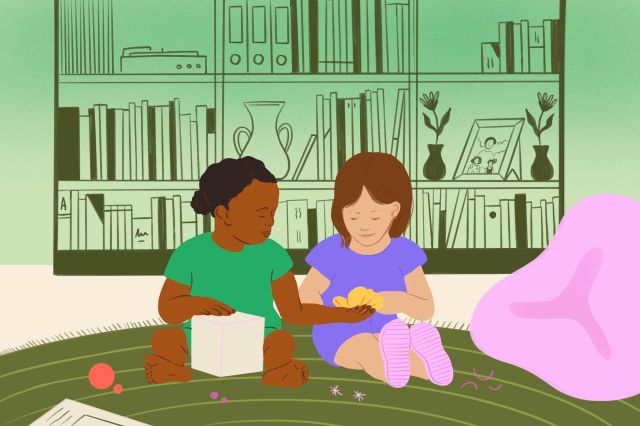“Mine!” It’s every toddler’s favorite word. Whether it’s a toy or a snack or something seemingly mundane like an acorn fallen from a tree, toddlers learn to test our limits early on and love to have things all to themselves. But sharing with others is an important life skill and falls in line with raising kind kids right? We asked four toddler parents for their thoughts on young kids and sharing.
To Share or Not to Share
“Most of the toys in our house are shared toys. I encourage my children to take turns with the most highly favored toys. They learn to work through their struggle to share because if a coveted toy becomes the source of tantrums and meltdowns, I take it away. No one’s happy when I do that, so they’ve learned to figure out sharing methods that work for them to avoid losing the toy altogether.” —Melanie M.
“We’ve never forced sharing and have two of the most generous kids I’ve ever met (even though one of them tends a bit toward jealousy). Sharing with authentic generosity requires the ability to put yourself into another’s shoes, understand their perspective, and prioritize their desires above your own. That is a really advanced thing to be able to do; most kids can’t manage it with any predictability until at least age four. So expecting kids to share younger than that really isn’t developmentally appropriate.” —Laura F.
“Sharing is something that is important to us, whether it is sharing a tangible item (like a toy) or an idea at the dinner table. Having two kids can sometimes feel like having two only children. They expect to have their own of everything.” —Lindsay C.
“Although it’s great to establish a strong relationship with your children early on, from their toddler years, sharing shouldn’t be something that is forced on them. In fact, if you pressure kids into sharing when they don’t feel comfortable to, you may trigger a range of negative consequences, like feelings of guilt.” —Emilie M.
Instead, Try…
Turn-taking is the name of the game at Laura’s home because this allows each child to get their fill of a toy. As she notes, turn-taking is rooted in abundance and can help a tot understand that there is plenty of time to play with the different toys, making genuine sharing much easier. This is opposed to looking at sharing in terms of scarcity: “I better hold on to them for dear life even if I don’t really want them!”
Moreover, Emilie suggests introducing the concept of teamwork to help the desire to share come about naturally. The goal is for tots to find the fun in group play. Lindsay agrees and suggests activities like baking when kids can take turns adding ingredients and stirring.
Except When…
Melanie has five children and each has some toys that belong to them individually that they’re not expected to share. “If their arguments get out of hand, I remind the jealous child that the toy in question belongs to the one who owns it,” she says. When they’re out and about, at a park for example, there is no sharing requirement with strangers on the spot. But inviting people into the house means there’s an expectation of sharing, except those special toys tucked away for safekeeping beforehand.
Similarly, Lindsay acknowledges there are scenarios when sharing doesn’t need to happen. This might happen when your child has a sense of ownership and independence related to their belongings. “However, being able to consider others is definitely a valuable skill that will be beneficial in many ways throughout life,” she adds.
Tips for Sharing
1. Arguing is acceptable!
Sharing isn’t always smooth sailing for Melanie’s five kids. “They’re learning to work through their disagreements,” she says. This means some arguing back and forth, which can actually help develop problem-solving skills. “Still, I try to monitor and intervene if their fights become one-sided where one child consistently dominates, and the other gives in,” she adds.
2. Be generous with turn times.
Laura swears by the magic of a long turn. Some parents might think short turns encourage sharing, but in Laura’s experience, a child is more willing to give up a toy if they know that long turns are in order for everyone.
3. Share more than just things.
Handing over a toy is one big step in the right direction in teaching tots how to be good little people, but sharing also applies to time, space, attention, and ideas. “We like to sit at the breakfast or dinner table as a family and share our thoughts on the day, the week, or a specific subject. Everyone waits their turn even if they have something they want to say immediately,” Lindsay says.
4. Be patient.
Finally, Emilie has a simple reminder: “Be gentle, calm, and patient, and always lead by example.”
RELATED STORIES:
10 Ways to Get Kids to Enjoy Gardening
Is This Normal? My Toddler Refuses to Eat
10 Snacks a Pediatrician Always Feeds Her Kids











